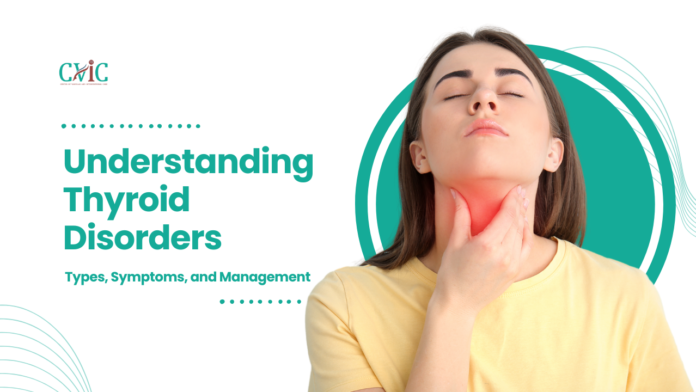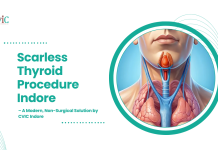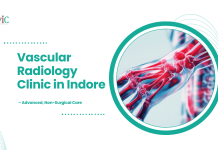Understanding thyroid disorders is crucial for maintaining overall health, as the thyroid gland plays a pivotal role in regulating metabolism, growth, and development. The thyroid gland, a butterfly-shaped organ located at the base of the neck, produces hormones essential for various bodily functions. Disruptions in thyroid function can lead to a range of disorders, each with its unique set of symptoms and management strategies. This article provides an in-depth exploration of thyroid disorders, covering their types, symptoms, diagnostic methods, and management techniques.
The Thyroid Gland: An Overview
The thyroid gland is integral to the endocrine system, producing hormones that influence almost every cell in the body. It primarily secretes two hormones: thyroxine (T4) and triiodothyronine (T3), which regulate metabolism, energy generation, and overall growth. The production and release of these hormones are controlled by the thyroid-stimulating hormone (TSH) from the pituitary gland. Proper thyroid function is critical for maintaining homeostasis, and any imbalances can have widespread health implications.

Types of Thyroid Disorders
Thyroid disorders can be broadly categorized based on whether they involve an overactive or underactive thyroid, structural abnormalities, or malignancies.
Hypothyroidism
Hypothyroidism occurs when the thyroid gland fails to produce sufficient hormones, leading to a slowdown in metabolic processes. Common causes include Hashimoto’s thyroiditis, iodine deficiency, and certain medications. Symptoms often include fatigue, weight gain, cold intolerance, and depression.
Hyperthyroidism
In contrast, hyperthyroidism is characterized by an overproduction of thyroid hormones, accelerating the body’s metabolism. Graves’ disease is a common cause, along with thyroid nodules and excessive iodine intake. Symptoms include weight loss, heat intolerance, anxiety, and palpitations.
Goiter
Goiter refers to an abnormal enlargement of the thyroid gland. It can result from iodine deficiency, Hashimoto’s thyroiditis, or Graves’ disease. A visible swelling in the neck is the most common sign, sometimes accompanied by breathing or swallowing difficulties.
Thyroid Nodules
Thyroid nodules are lumps that form within the thyroid. While most nodules are benign, a small percentage can be cancerous. They are often detected during routine examinations or imaging studies.
Thyroid Cancer
Thyroid cancer, although relatively rare, can develop from the cells of the thyroid gland. It includes several types, such as papillary, follicular, medullary, and anaplastic thyroid cancer. Symptoms might include a lump in the neck, changes in voice, and difficulty swallowing.
Hashimoto’s Thyroiditis
This autoimmune disorder causes the immune system to attack the thyroid gland, leading to chronic inflammation and eventual hypothyroidism. It is the most common cause of hypothyroidism in iodine-sufficient regions.
Graves’ Disease
Graves’ disease is an autoimmune condition that results in hyperthyroidism. The immune system stimulates the thyroid to produce excessive hormones, causing symptoms like bulging eyes (exophthalmos), weight loss, and irritability.
Symptoms of Thyroid Disorders
The symptoms of thyroid disorders vary depending on the type and severity of the condition.
Common Symptoms of Hypothyroidism
- Fatigue and weakness
- Weight gain
- Cold intolerance
- Dry skin and hair
- Depression
- Constipation
Common Symptoms of Hyperthyroidism
- Unintentional weight loss
- Rapid heartbeat
- Increased appetite
- Nervousness and anxiety
- Tremors
- Heat intolerance
Signs of Goiter
- Visible swelling at the base of the neck
- Tight feeling in the throat
- Coughing
- Difficulty swallowing or breathing
Symptoms of Thyroid Nodules and Cancer
- Lump or swelling in the neck
- Pain in the neck or throat
- Hoarseness or voice changes
- Difficulty swallowing
- Persistent cough not related to a cold
Autoimmune Thyroid Disorder Symptoms
- Fatigue
- Muscle weakness
- Joint pain
- Swelling in the neck
- Symptoms of other autoimmune conditions

Diagnosing Thyroid Disorders
Accurate diagnosis is essential for effective management of thyroid disorders. Several diagnostic tools and techniques are employed.
Blood Tests
Blood tests measure levels of thyroid hormones (T3 and T4) and TSH. Elevated TSH levels typically indicate hypothyroidism, while low TSH levels suggest hyperthyroidism. Additional tests may measure thyroid antibodies to diagnose autoimmune thyroid conditions.
Imaging Studies
Ultrasound is commonly used to assess the structure of the thyroid and detect nodules or other abnormalities. Radioactive iodine uptake tests and thyroid scans can evaluate thyroid function and identify areas of overactivity or underactivity.
Biopsies
Fine-needle aspiration biopsies are performed to determine whether thyroid nodules are benign or malignant. This involves using a thin needle to extract cells from the nodule for microscopic examination.
Physical Examination
A thorough physical examination, including palpation of the neck, can reveal the presence of goiter, nodules, or other abnormalities. The doctor may also check for signs of hyperthyroidism or hypothyroidism.
Risk Factors and Causes
Understanding the risk factors and causes of thyroid disorders can aid in prevention and early detection.
Genetic Factors
A family history of thyroid disorders increases the risk of developing similar conditions. Genetic mutations can also predispose individuals to thyroid cancer or autoimmune thyroid diseases.
Environmental Influences
Exposure to radiation, especially during childhood, increases the risk of thyroid cancer. Certain environmental toxins and pollutants can also affect thyroid function.
Iodine Deficiency
Iodine is essential for thyroid hormone production. A deficiency can lead to goiter and hypothyroidism, while excessive iodine intake can trigger hyperthyroidism in susceptible individuals.
Autoimmune Conditions
Autoimmune diseases such as Hashimoto’s thyroiditis and Graves’ disease result from the immune system mistakenly attacking the thyroid gland, leading to hypothyroidism or hyperthyroidism.
Lifestyle and Diet
Poor diet, lack of exercise, and high stress levels can contribute to the development of thyroid disorders. Smoking has also been linked to an increased risk of Graves’ disease and thyroid eye disease.
Impact on Different Populations
Thyroid disorders can affect different populations in unique ways, necessitating tailored management approaches.
Children and Adolescents
Thyroid disorders in children can affect growth and development. Symptoms may include changes in weight, energy levels, and academic performance. Early diagnosis and treatment are crucial for normal development.
Pregnant Women
Thyroid disorders can complicate pregnancy, affecting both the mother and the fetus. Hypothyroidism and hyperthyroidism must be carefully managed to avoid adverse outcomes such as preterm birth and developmental delays in the baby.
Elderly
Thyroid disorders in the elderly may present with atypical symptoms, making diagnosis challenging. Age-related changes in thyroid function and medication metabolism must be considered in treatment plans.
Men versus Women
Thyroid disorders are more common in women than men. Hormonal changes during menstruation, pregnancy, and menopause can influence thyroid function, contributing to higher prevalence rates in women.
Hypothyroidism: In-depth Analysis
Hypothyroidism is a common thyroid disorder with significant health impacts if left untreated.
Causes of Hypothyroidism
Common causes include autoimmune diseases like Hashimoto’s thyroiditis, iodine deficiency, and treatment for hyperthyroidism. Certain medications and radiation therapy can also impair thyroid function.
Symptoms and Progression
Symptoms develop gradually and may be mistaken for other conditions. They include fatigue, weight gain, cold intolerance, and depression. Untreated hypothyroidism can lead to severe complications such as myxedema coma.
Diagnostic Methods
Blood tests measuring TSH and thyroid hormones are the primary diagnostic tools. High TSH and low T4 levels confirm hypothyroidism. Additional tests may include thyroid antibody testing and imaging studies.
Treatment Options
Treatment typically involves daily use of synthetic thyroid hormone levothyroxine. Regular monitoring and dose adjustments are essential to maintain optimal thyroid hormone levels.
Hyperthyroidism: In-depth Analysis
Hyperthyroidism requires prompt diagnosis and treatment to prevent serious health issues.
Causes of Hyperthyroidism
Graves’ disease is the most common cause, followed by toxic nodular goiter and thyroiditis. Excessive iodine intake and certain medications can also induce hyperthyroidism.
Symptoms and Progression
Symptoms include weight loss, rapid heartbeat, anxiety, and heat intolerance. If untreated, hyperthyroidism can lead to complications such as thyroid storm, a life-threatening condition.
Diagnostic Methods
Blood tests show low TSH and high thyroid hormone levels. Additional tests include radioactive iodine uptake and thyroid scans to determine the underlying cause.
Treatment Options
Treatment options include antithyroid medications, radioactive iodine therapy, and surgery. Beta-blockers may be used to control symptoms while other treatments take effect.
Managing Thyroid Disorders
Effective management of thyroid disorders involves a combination of medical treatment, lifestyle adjustments, and regular monitoring.
Medication Management
Medications like levothyroxine for hypothyroidism and antithyroid drugs for hyperthyroidism are crucial. Regular follow-ups ensure appropriate dosing and monitor for side effects.
Diet and Lifestyle Modifications
A balanced diet rich in iodine, selenium, and zinc supports thyroid health. Avoiding processed foods and reducing stress through exercise and relaxation techniques can improve overall well-being.
Alternative Therapies
Some patients benefit from complementary therapies such as acupuncture, herbal supplements, and yoga. However, these should be used alongside, not as replacements for, conventional treatments.
Monitoring and Follow-up
Regular blood tests and check-ups are essential to ensure effective management of thyroid disorders. Adjustments to treatment plans may be necessary based on test results and symptom changes.
Living with Thyroid Disorders
Living with thyroid disorders requires adjustments to daily life and a focus on mental and physical health.
Daily Life Adjustments
Maintaining a consistent routine, taking medications as prescribed, and following a healthy diet are crucial. Monitoring symptoms and seeking prompt medical advice for any changes is important.
Psychological Impact
Thyroid disorders can affect mental health, causing anxiety, depression, and mood swings. Support from healthcare providers, family, and mental health professionals can help manage these challenges.
Support Systems
Connecting with others through support groups, both online and offline, provides valuable emotional support and practical advice. Education about the condition helps patients and their families understand and manage it better.
Thyroid Disorders in Pregnancy
Managing thyroid disorders during pregnancy is vital for the health of both the mother and the baby.
Effects on Pregnancy and Fetus
Uncontrolled thyroid disorders can lead to miscarriage, preterm birth, and developmental issues in the baby. Hyperthyroidism and hypothyroidism can also cause pregnancy complications like preeclampsia.
Managing Thyroid Disorders During Pregnancy
Regular monitoring of thyroid hormone levels and adjusting medication dosages as needed are essential. Close collaboration between endocrinologists and obstetricians ensures optimal care.
Postpartum Thyroiditis
Some women experience thyroid dysfunction after childbirth, known as postpartum thyroiditis. Symptoms may include fatigue, weight changes, and mood disturbances. Monitoring and treatment help manage this condition effectively.
Pediatric Thyroid Disorders
Thyroid disorders in children require prompt diagnosis and treatment to support healthy growth and development.
Common Thyroid Disorders in Children
Congenital hypothyroidism, autoimmune thyroiditis, and hyperthyroidism are common in children. Symptoms may include growth retardation, developmental delays, and behavioral changes.
Symptoms and Diagnosis
Parents and caregivers should watch for signs such as changes in weight, energy levels, and school performance. Blood tests and imaging studies confirm the diagnosis.
Treatment Approaches
Treatment depends on the specific disorder and may include hormone replacement therapy, antithyroid medications, or surgery. Regular follow-ups ensure proper growth and development.
Thyroid Cancer: What You Need to Know
Thyroid cancer, though relatively rare, requires careful diagnosis and treatment.
Types of Thyroid Cancer
The main types include papillary, follicular, medullary, and anaplastic thyroid cancer. Papillary thyroid cancer is the most common and has a good prognosis with early treatment.
Symptoms and Detection
Symptoms may include a lump in the neck, voice changes, and difficulty swallowing. Fine-needle aspiration biopsy, ultrasound, and blood tests aid in diagnosis.
Treatment and Prognosis
Treatment options include surgery, radioactive iodine therapy, and thyroid hormone therapy. The prognosis depends on the cancer type, stage, and patient’s overall health.
Thyroid Surgery: Indications and Outcomes
Surgery is sometimes necessary for managing thyroid disorders.
When is Surgery Necessary?
Surgery may be indicated for large goiters, suspicious or cancerous nodules, and severe hyperthyroidism not responsive to other treatments. The decision is based on individual patient factors.
Types of Thyroid Surgery
Surgical options include total thyroidectomy (removal of the entire thyroid) and lobectomy (removal of part of the thyroid). The choice depends on the condition being treated.
Post-surgery Care and Recovery
Recovery includes managing pain, monitoring calcium levels, and adjusting thyroid hormone replacement therapy. Regular follow-ups ensure proper healing and thyroid function.
Prevention and Early Detection
Preventing and detecting thyroid disorders early improves outcomes and quality of life.
Preventive Measures
A healthy diet, regular exercise, and avoiding known risk factors like excessive iodine intake and smoking can reduce the risk of thyroid disorders. Genetic counseling may be beneficial for those with a family history.
Screening Recommendations
Routine screening is recommended for high-risk groups, including those with a family history of thyroid disorders, pregnant women, and individuals with autoimmune conditions.
Importance of Early Detection
Early detection through regular check-ups and blood tests allows for prompt treatment, reducing the risk of complications and improving long-term outcomes.
Frequently Asked Questions
What are the early signs of thyroid disorders?
Early signs vary but often include changes in weight, energy levels, and mood. For hypothyroidism, look for fatigue, weight gain, and depression. For hyperthyroidism, symptoms like weight loss, rapid heartbeat, and anxiety are common.
Can thyroid disorders be cured?
Many thyroid disorders can be effectively managed with medication, lifestyle changes, and in some cases, surgery. While some conditions may require lifelong treatment, proper management allows individuals to lead healthy lives.
How are thyroid disorders diagnosed?
Diagnosis typically involves blood tests to measure thyroid hormone and TSH levels. Imaging studies like ultrasound and radioactive iodine scans, as well as biopsies, may also be used to assess thyroid structure and function.
What are the best foods for thyroid health?
Foods rich in iodine, selenium, and zinc support thyroid health. These include seafood, dairy products, nuts, seeds, and whole grains. Avoiding processed foods and excessive soy products is also beneficial.
Can stress cause thyroid disorders?
While stress alone doesn’t cause thyroid disorders, it can exacerbate symptoms and trigger autoimmune responses in susceptible individuals. Managing stress through relaxation techniques and a healthy lifestyle is important.
How do thyroid medications work?
Thyroid medications work by either replacing deficient hormones (in hypothyroidism) or reducing hormone production (in hyperthyroidism). Regular monitoring ensures proper dosing and effectiveness.
Conclusion
Understanding thyroid disorders is essential for early diagnosis, effective treatment, and improved quality of life. By recognizing the types, symptoms, and management strategies of thyroid disorders, individuals can take proactive steps to maintain their thyroid health. Regular check-ups, a balanced diet, and a healthy lifestyle play crucial roles in managing thyroid disorders and ensuring overall well-being.

Our Doctors
Dedicated IR Center for Vascular Problems in Madhya Pradesh
DR. SHAILESH GUPTA
MD, PDCC (INTERVENTIONAL RADIOLOGY) Consultant & Co-Director CVIC (Center Of Vascular & Interventional Care)
DR. ALOK KUMAR UDIYA
MD Radiology, PDCC (Neurointervention Radiology), PDCC ( HPB Intervention Radiology) FINR (Switzerland) & EBIR
Endovascular Surgeon & Consultant Interventional Neuroradiologist at Care CHL Hospital, Indore Co-director CVIC( center for vascular and interventional care)
DR. NISHANT BHARGAVA
Consultant Intervention Radiologist
MD Radiology, PDCC ( Neurointervention Radiology), FINR ( Fellowship in Neurointervention Radiology)
Co-director CVIC(Center for Vascular and Interventional Care)
Contact Details
Phone no.
0731 4675670
+91 9827760073
Facebook
https://www.facebook.com/profile.php?id=100092538633553&mibextid=ZbWKwL
Instagram
https://instagram.com/cvic_center?igshid=ZGUzMzM3NWJiOQ==
Google My business
https://g.co/kgs/DrdV3T
YouTube
https://www.youtube.com/channel/UCP5TH5e4iQZkpDUgnLsgZhw
Pinterest
https://pin.it/5DzpX5Z
Twitter
https://x.com/cviccenter?t=01TclSrLFdu0K2re0Gs96w&s=08
LINKEDIN
https://www.linkedin.com/company/center-of-vascular-interventional-care/
Location –
Read More –
Living with a Metallic Stent: What to Expect and How to Adapt – https://cvicvascular.com/living-with-a-metallic-stent-what-to-expect-and-how-to-adapt/
The Benefits of Bleeder Embolization: Why Choose This Treatment? – https://cvicvascular.com/benefits-of-bleeder-embolization-why-choose-this-treatment/
Comprehensive Guide to Varicose Veins: Causes, Symptoms, and Treatment Options – https://cvicvascular.com/varicose-veins-causes-symptoms-treatment-options/




